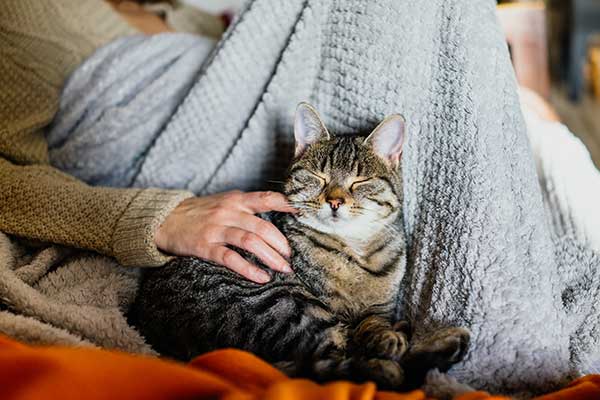
Cats can be loving balls of affection. Whether they’re rubbing themselves on your legs as you walk or kneading your belly as you watch TV, these creatures can be pretty animated in showing their love. However, that emotional nature works both ways!
We’ve all been there:
You accidentally step on your cat’s tail or wake them up from a deep nap. While dogs will forgive and forget within seconds, cats are prone to showing their dissatisfaction with you!
After offending or irritating them, your cat might give you the cold shoulder for several hours!
It can be a funny experience that only helps you appreciate your cat more! That signature death-stare is photo-worthy, and the general irritability they exhibit is great for a few laughs. But how long does that behavior hold up?
Can cats truly hold grudges?
Understanding Feline Memory
To understand how cats hold grudges, you must understand how their memory works. Every animal is capable of reacting at the moment. Cats are pretty animated, so their actions sometimes seem over the top.
But precisely how do they process those experiences?
Like humans, cats have two types of memory.
The first is working memory. It refers to how much a feline can remember at any given moment. While the scientific community continues to learn about cats all the time, studies from the past don’t paint the best picture of a cat’s working memory!
These animals are relatively intelligent; there’s no doubt about that. However, they don’t seem to have the best working memory.
Studies showed that ordinary household cats are likely to forget things within 30 seconds. This test was performed with toys, but it’s a decent indicator of what’s happening in a cat’s noggin.
The second type of memory is long-term memory. In the context of grudges, this is the most important one. Long-term memory is a cat’s ability to recall experiences from the past. While felines don’t have the best working memory, their long-term memory is pretty decent.
According to research from 1964, the long-term memory of a cat is about 16 hours.
Now, take that information with a grain of salt. The study was from more than 50 years ago. It was controversial at the time, and there’s some doubt about the legitimacy of the information given what we know about cats now.
More recent explorations of the topic show that a cat’s long-term memory lasts upwards of four days!
There’s no way to know for sure. To add to the confusion, memory capacity can vary based on age, breed, and environment!
Even still, 16 hours is the “go-to” for feline memory information.
6 Signs That Your Cat Isn’t Happy With You
Not sure if your cat is truly mad at you? Trust us: You’ll know!

Cat’s have no shame in letting you know that they’re unhappy with you. These creatures are the epitome of petty, and you’ll likely notice a stark difference in their behavior. Here are just some signs of anger cats show towards their owners.
1. Physical Cues
Physical cues are pretty subtle. But if you spend a ton of time with your cat, you may notice right off the bat.
Cats often fluff themselves up as they go into defense mode. That suddenly puffy look is driven by anger and annoyance! You might also see the end of the tail twitch back and forth as they try to calm down.
The final cue is all about the ears. Like dogs, cats use their ears to indicate fear or aggression. Instead of being perky and inviting, they’ll look flat.
2. Messy Behavior
Here’s why cats often get a reputation for being mean and petty! When they’re angry with their owners, cats can sometimes resort to making messes.
They might scatter things around your home, flinging everything from cat litter to toys everywhere they can.
In some cases, cats will even urinate and defecate on clean surfaces. Keep an eye on your bed and sofa if you make your cat mad!
3. The Death Stare
The dreaded death stare is not just a meme. It’s a real thing!
Cats tend to have a cold and intimidating look. The eyes become thin while the face looks like they’re about to go on the attack instead of the inviting and doe-eyed look you’re used to seeing.
4. Avoidance
Many cats will straight-up avoid their owners when they get mad. Your feline friend might leave the room when you enter or hide beneath furniture so that you’re not in their line of sight.
5. Odd Eating Habits
When dinner time rolls around, your cat might choose to stay hungry rather than interact with you. Many cats will avoid their favorite foods, leaving their meals untouched in the bowl for you to clean up later.
6. Physical Aggression
Finally, some cats will resort to physical aggression. This sign of anger is rarer, but it can occur. You might experience the occasional swipe, scratch, or bite in retaliation for whatever offending action you did.
How Long Does a Cat’s Grudge Last?
Cats are no strangers to holding grudges. Luckily, that mean streak usually lasts up to 16 hours at most. It can take a day for your cat to forgive and forget, but it’ll pass soon enough.
Of course, every action is different. How long your cat holds onto its anger depends on what you did. Here are some actions that most cats will get over within a day.
Unwanted Handling
Every cat owner has scooped up their feline friend at one point, only to be met with a claw swipe. Don’t let their small stature fool you. Not all cats like to be held! Even those that do have their limits.
The key to comfortable handling is to let your cat come to you. In those cases, the cat’s actions are an open invitation to lift them up in your arms.
Anything outside of that could cause trouble. Cats sometimes don’t like handling because it restricts their movement. Some may have a history of abusive behavior that involves handling, too.
Nap Disruption
Did you know that cats can sleep up to 16 hours a day? When you spot your kitty lounging in the sun, please resist the urge to wake them!
Otherwise, you might experience the wrath of the feline! Cats don’t like their rest to be interrupted. It ruins their day, resulting in a mean streak that could last several hours.
Uninvited Entry
Cats don’t like it when you enter their space uninterrupted. What do they consider “theirs?” Usually, any place your cat spends a lot of time in becomes a sacred space.
The most common areas are beds, litter boxes, or even a spot on the couch they like to nap. Don’t be surprised when your cat gets angry if you encroach on that space or take it away.
Too Much Attention
Petting and cuddling are fine if you have a strong bond with your cat. It makes them feel loved and appreciated. However, every feline has its limits.
Cats need their space, and too much affection will only make them angry. Learn to read your cat’s body language. When it’s had enough, it’ll let you know.
Related: How Much Attention Do Cats Need?
Boredom
Do you spend most of your day away? If so, your cat could become angry with you. While they do need space, cats also require stimulation and play!
Without it, they grow restless and bored. Your cat notices your absent, and spending too much time away could put you in the dog house!
Not Enough Attention
Believe it or not, a lack of attention can have just the same effect as too much. You have to learn how to strike a balance that works for your cat.
If you have other pets in the house, cats can sometimes grow jealous. Make sure to share your time equally to avoid making your cat angry.
Accidental Hit
Cats can sometimes get in the way. Whether they’re climbing on kitchen countertops or getting in front of your computer as you work, it’s surprisingly easy to hit them accidentally.
Cats don’t like that sudden act of perceived aggression. Even if it was accidental, your cat will likely need space to recover.
Touching Sensitive Areas
Finally, touching sensitive spots on your cat’s body could make them uncomfortable. The most common culprits are the paws and tail. However, some cats don’t like belly rubs or face touching.
Whatever the case may be, your cat will probably show their displeasure and give you the cold shoulder to teach you a lesson.
What About Traumatic Events?
We know that cats usually get over things in less than a day. However, cats can also exhibit long-lasting effects from traumatic events. Just ask anyone who works at an animal shelter or rescue operation.
Cats from bad homes tend to be reserved, anxious, and defensive. While these creatures quickly forget small slights, traumatic or reoccurring events will have a more profound impact.
Cats connect experiences to people and objects.
Think of it as training. You can train your cat to do certain things by providing a treat because you’re establishing a connection with a behavior and a tasty snack. Negative reinforcement has a similar effect.
The bigger the trauma and more frequently it occurs, the longer your cat will remember it.
Stepping on your cat’s tail, repeated abuse, and ongoing punishment are things that cats won’t forget too soon.
Smoothing Things Over
For the most part, cats let go of their anger within a day. The best thing you can do to keep the peace is give your cat plenty of space. It’ll come to you when it’s ready to make up and go on with your lives!
If you want to create peace sooner, you can offer your cat’s favorite toy or a blanket for cuddling. Just don’t force things.
Your cat’s emotions are delicate! Do your best to identify the issue and address it. As long as it doesn’t become a regular thing, your cat will be back in your arms, giving you affection in no time!
Also Read:
- Do Cats Know When You Are Sad?
- Why Does My Cat Reach His Paw Out to Me?
- My Cat Wont Let Me Sleep
- Why Do Cats Flop Over?
- Why Does My Cat Lay on My Chest?

